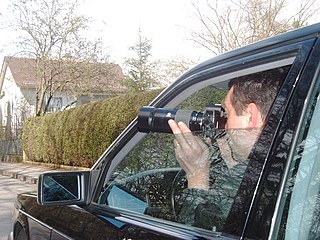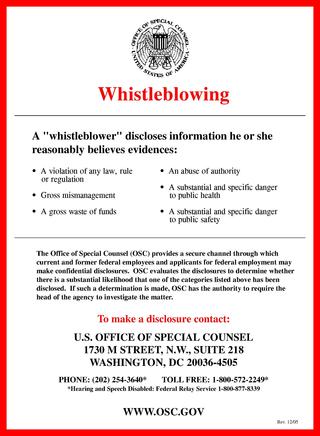
Allan Pinkerton was a Scottish-American cooper, abolitionist, detective, and spy, best known for creating the Pinkerton National Detective Agency in the United States and his claim to have foiled a plot in 1861 to assassinate president-elect Abraham Lincoln. During the Civil War, he provided the Union Army – specifically General George B. McClellan of the Army of the Potomac – with military intelligence, including extremely inaccurate enemy troop strength numbers. After the war, his agents played a significant role as strikebreakers – in particular during the Great Railroad Strike of 1877 – a role that Pinkerton men would continue to play after the death of their founder.

A private investigator, a private detective, or inquiry agent is a person who can be hired by individuals or groups to undertake investigatory law services. Private investigators often work for attorneys in civil and criminal cases.
A work made for hire, in copyright law in the United States, is a work that is subject to copyright and is created by employees as part of their job or some limited types of works for which all parties agree in writing to the WFH designation. Work for hire is a statutorily defined term and so a work for hire is not created merely because parties to an agreement state that the work is a work for hire. It is an exception to the general rule that the person who actually creates a work is the legally-recognized author of that work. In the United States and certain other copyright jurisdictions, if a work is "made for hire," the employer, not the employee, is considered the legal author. In some countries, this is known as corporate authorship. The entity serving as an employer may be a corporation or other legal entity, an organization, or an individual.

Pinkerton is a private security guard and detective agency established around 1850 in the United States by Scottish-born American cooper Allan Pinkerton and Chicago attorney Edward Rucker as the North-Western Police Agency, which later became Pinkerton & Co. and finally the Pinkerton National Detective Agency. At the height of its power from the 1870s to the 1890s, it was the largest private law enforcement organization in the world. It is currently a subsidiary of Swedish-based Securitas AB.
In United States labor law, at-will employment is an employer's ability to dismiss an employee for any reason, and without warning, as long as the reason is not illegal. When an employee is acknowledged as being hired "at will", courts deny the employee any claim for loss resulting from the dismissal. The rule is justified by its proponents on the basis that an employee may be similarly entitled to leave their job without reason or warning. The practice is seen as unjust by those who view the employment relationship as characterized by inequality of bargaining power.
A pre-entry closed shop is a form of union security agreement under which the employer agrees to hire union members only, and employees must remain members of the union at all times to remain employed. This is different from a post-entry closed shop, which is an agreement requiring all employees to join the union if they are not already members. In a union shop, the union must accept as a member any person hired by the employer. By comparison, an open shop does not require union membership of potential and current employees.
A work of the United States government is defined by the United States copyright law, as "a work prepared by an officer or employee of the United States Government as part of that person's official duties". Under section 105 of the Copyright Act of 1976, such works are not entitled to domestic copyright protection under U.S. law and are therefore in the public domain.

The Hatch Act of 1939, An Act to Prevent Pernicious Political Activities, is a United States federal law that prohibits civil-service employees in the executive branch of the federal government, except the president and vice president, from engaging in some forms of political activity. It became law on August 2, 1939. The law was named for Senator Carl Hatch of New Mexico. It was most recently amended in 2012.
In the United States Senate, the La Follette Civil Liberties Committee, or more formally, Committee on Education and Labor, Subcommittee Investigating Violations of Free Speech and the Rights of Labor (1936–1941), began as an inquiry into a National Labor Relations Board (NLRB) investigation of methods used by employers in certain industries to avoid collective bargaining with unions.
Community for Creative Non-Violence v. Reid, 490 U.S. 730 (1989), is a US copyright law and labor law case of a United States Supreme Court case regarding ownership of copyright.

The United States Office of Special Counsel (OSC) is a permanent independent federal investigative and prosecutorial agency whose basic legislative authority comes from four federal statutes: the Civil Service Reform Act, the Whistleblower Protection Act, the Hatch Act, and the Uniformed Services Employment and Reemployment Rights Act (USERRA). OSC's primary mission is the safeguarding of the merit system in federal employment by protecting employees and applicants from prohibited personnel practices (PPPs), especially reprisal for "whistleblowing." The agency also operates a secure channel for federal whistleblower disclosures of violations of law, rule, or regulation; gross mismanagement; gross waste of funds; abuse of authority; and substantial and specific danger to public health and safety. In addition, OSC issues advice on the Hatch Act and enforces its restrictions on partisan political activity by government employees. Finally, OSC protects the civilian employment and reemployment rights of military service members under USERRA. OSC has around 140 staff, and the Special Counsel is an ex officio member of Council of Inspectors General on Integrity and Efficiency (CIGIE), an association of inspectors general charged with the regulation of good governance within the federal government.

Union busting is a range of activities undertaken to disrupt or weaken the power of trade unions or their attempts to grow their membership in a workplace.

Equal employment opportunity is equal opportunity to attain or maintain employment in a company, organization, or other institution. Examples of legislation to foster it or to protect it from eroding include the U.S. Equal Employment Opportunity Commission, which was established by Title VII of the Civil Rights Act of 1964 to assist in the protection of United States employees from discrimination. The law was the first federal law designed to protect most US employees from employment discrimination based on that employee's race, color, religion, sex, or national origin.
The United States federal civil service is the civilian workforce of the United States federal government's departments and agencies. The federal civil service was established in 1871. U.S. state and local government entities often have comparable civil service systems that are modeled on the national system to varying degrees.
Labor spying in the United States had involved people recruited or employed for the purpose of gathering intelligence, committing sabotage, sowing dissent, or engaging in other similar activities, in the context of an employer/labor organization relationship. Spying by companies on union activities has been illegal in the United States since the National Labor Relations Act of 1935. However, non-union monitoring of employee activities while at work is perfectly legal and, according to the American Management Association, nearly 80% of major US companies actively monitor their employees.

The District of Columbia has a mayor–council government that operates under Article One of the United States Constitution and the District of Columbia Home Rule Act. The Home Rule Act devolves certain powers of the United States Congress to the local government, which consists of a mayor and a 13-member council. However, Congress retains the right to review and overturn laws created by the council and intervene in local affairs.
Alliance for Open Society International, Inc. (AOSI) is a U.S. public charity organized in 2003 under the laws of the State of Delaware.
The Bureau of Military Information (BMI) was the first formal and organized American intelligence agency, active during the American Civil War.

The history of union busting in the United States dates back to the Industrial Revolution in the 19th century. The Industrial Revolution produced a rapid expansion in factories and manufacturing capabilities. As workers moved from farms to factories, mines and other hard labor, they faced harsh working conditions such as long hours, low pay and health risks. Children and women worked in factories and generally received lower pay than men. The government did little to limit these conditions. Labor movements in the industrialized world developed and lobbied for better rights and safer conditions. Shaped by wars, depressions, government policies, judicial rulings, and global competition, the early years of the battleground between unions and management were adversarial and often identified with aggressive hostility. Contemporary opposition to trade unions known as union busting started in the 1940s, and continues to present challenges to the labor movement. Union busting is a term used by labor organizations and trade unions to describe the activities that may be undertaken by employers, their proxies, workers and in certain instances states and governments usually triggered by events such as picketing, card check, worker organizing, and strike actions. Labor legislation has changed the nature of union busting, as well as the organizing tactics that labor organizations commonly use.

A whistleblower is a person who exposes any kind of information or activity that is deemed illegal, unethical, or not correct within an organization that is either private or public. The Whistleblower Protection Act was made into federal law in the United States in 1989.









